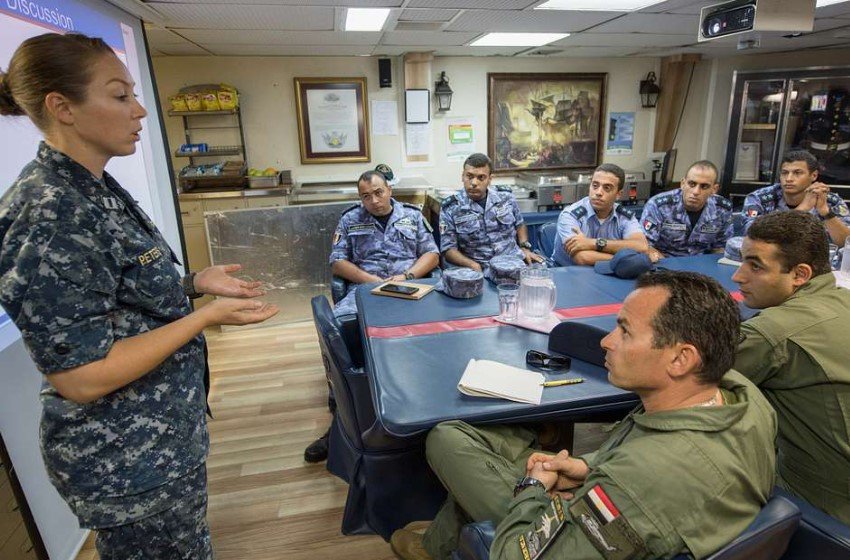Egypt’s Armed Forces Focus on Combat Readiness and Naval Strength as Strategic Challenges Evolve
Amid shifting regional dynamics and growing international uncertainties, Egypt’s military is strengthening its combat readiness to deter both current and future threats, ensuring the country’s national security across all strategic fronts. This strategic shift, driven by the evolving security landscape, has seen the Egyptian Armed Forces implement comprehensive measures to bolster their capabilities and safeguard the nation’s stability. According to Gharib Abdel-Hafez, Spokesman for the Egyptian Armed Forces, the country’s military development is a direct response to these changes, backed by strong political leadership and an unyielding commitment to preserving Egypt’s security interests.
The Egyptian Armed Forces’ recent expansion and modernization efforts are designed to meet these evolving threats head-on. Abdel-Hafez emphasized that since 2013, Egypt’s military has undergone an unprecedented arms buildup, diversifying its sources of military technology and equipment. This extensive development is aimed at enhancing the combat proficiency of Egypt’s military across all branches, ensuring readiness for both conventional and asymmetric warfare. The overarching strategy focuses on modernizing equipment, upgrading combat systems, and improving technical skills to adapt to rapidly advancing military technologies.

The Egyptian military’s investment in new technologies and systems is not just about keeping pace with global military advancements but also about positioning the Armed Forces to respond swiftly and effectively to any threat—whether in defense of its borders, the security of vital national interests, or as part of international peacekeeping efforts. The enhanced readiness reflects Egypt’s proactive approach in maintaining its sovereignty, ensuring its role as a regional power while securing its strategic objectives.
One of the standout elements of Egypt’s military expansion has been the strengthening of its naval forces. Abdel-Hafez revealed that Egypt has established two major naval fleets dedicated to securing maritime operations in the Mediterranean and the Red Seas. The strategic positioning of these fleets is vital, considering Egypt’s critical role as a gateway for global trade routes, with the Suez Canal acting as a key passage for international shipping. These fleets, equipped with modern and versatile naval assets, are designed to ensure both offensive and defensive capabilities, securing Egypt’s coastline, which stretches for 2,936 kilometers.
In line with Egypt’s emphasis on a robust and modernized naval force, the country has signed several high-profile arms deals over the past years, further bolstering its naval capabilities. Among the notable acquisitions are the French-manufactured Mistral-class landing helicopter docks, which enhance the military’s ability to carry out amphibious operations. These vessels, which can carry helicopters and troops, increase Egypt’s mobility and operational flexibility, allowing the military to respond quickly to regional contingencies.
Another significant upgrade to Egypt’s naval forces is the acquisition of German-made Type 209/1400 attack submarines. These submarines are among the most advanced in their class, capable of conducting deep-water operations and offering significant stealth advantages in maritime defense. The new additions to the Egyptian fleet also include the Italian-made FREMM multipurpose frigates, which are designed for a wide range of missions, from anti-aircraft defense to anti-submarine warfare. These frigates, combined with Egypt’s domestically built Gowind-class corvettes and the MEKO A200 frigates, form the backbone of Egypt’s modern naval defense.
With these substantial upgrades to its naval forces, Egypt is not only enhancing its defense capabilities but also asserting its presence as a major power in the Mediterranean and Red Sea regions. The country’s growing fleet allows it to more effectively control maritime traffic, safeguard energy resources, and protect vital trade routes. These developments are key to ensuring Egypt’s position as a regional leader capable of projecting power and maintaining stability in an area fraught with geopolitical tensions.
Moreover, Egypt’s military modernization is not just limited to naval capabilities. The country has also been expanding its air defense systems, upgrading its missile defense capabilities, and investing in advanced fighter jets, radar systems, and surveillance technologies. The aim is to create a well-rounded and highly responsive military force capable of addressing the full spectrum of potential threats. This multi-pronged approach ensures that Egypt remains prepared for any scenario, whether dealing with direct threats from neighboring states or managing the evolving complexities of regional terrorism and instability.
Abdel-Hafez further emphasized the importance of Egypt’s strategic alliances in maintaining its security objectives. By diversifying its defense partnerships and arms imports, Egypt ensures a broader range of military technologies and expertise, enabling it to respond more effectively to evolving threats. These partnerships, which include cooperation with European powers like France and Germany, as well as regional alliances, strengthen Egypt’s defense posture and contribute to its broader geopolitical strategy.
Egypt’s military modernization reflects a deliberate and strategic effort to enhance its combat readiness, particularly in response to the changing dynamics of the Middle East and North Africa. By upgrading its naval forces, diversifying arms sources, and improving overall combat capabilities, Egypt aims to safeguard its national security, protect its maritime interests, and assert itself as a key player in the region. As the country continues to face shifting security challenges, the Egyptian Armed Forces remain committed to evolving and adapting to ensure the defense and stability of the state.
